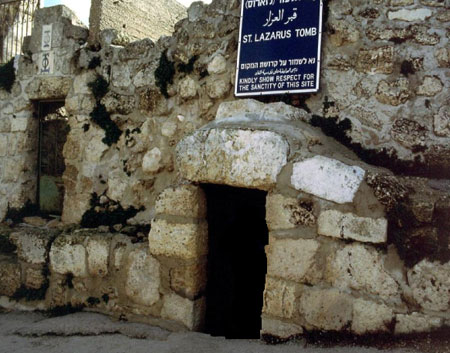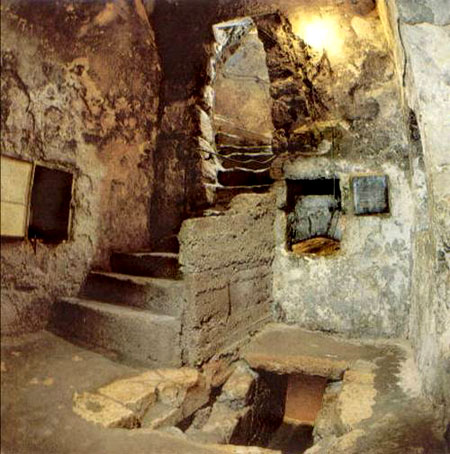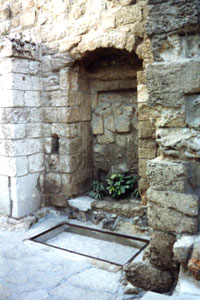
The precious and life-giving Cross is the holiest symbol of our Faith. All the Holy mysteries are completed by the invocation of the Holy Spirit and the seal of the Holy Cross. All the Hieratical prayers – of Holy Baptism, Holy Chrism, Holy Eucharist, Holy Matrimony, etc. – begin and end with the sign of the Cross. The Holy Temples, the Holy vessels and the liturgical vestments, and all liturgical actions are sanctified by the sign of the Holy Cross. Moreover, the Cross is the most faithful companion of every Orthodox Christian. From the moment we enter this world until we exit it in our final resting place – our tomb – we are accompanied by the blessing of the Cross. We bless ourselves with the sign of the Cross daily; we keep crosses at our homes, at our places of work and in our automobiles because we believe in the beautiful hymn of our Church…
The Cross is the guardian of the Universe; the Cross is the beauty of the Church; the Cross is the power of kings; the Cross is the staff of the Church; the Cross is the glory of angels; the Cross is the wounding of demons.
The symbol of the Cross is so indispensable that in its absence a church would be anything but a church of the Crucified Christ. The grace and power of the Cross is not due to the shape of the Cross per se but because it is the Cross of Christ. The Red Cross, Blue Cross and Blue Shield, the green cross of pharmacies or doctors – all these crosses are insignia of human institutions and, as such, totally irrelevant to the Cross of Christ. The Cross of Christ, on the other hand, is the organ by which He saved the world, the altar on which He offered Himself as the perfect offering, the pure offering of the prophecy of Malachi (1:6). All the kenosis, poverty, humiliation, pain, affliction and death He willingly accepted for us merge on the Cross. He suffered the greatest humiliation and pain upon the Cross; He became a curse to free us from the curse of the Law and the bondage of sin. All Christ’s work and all His philanthropy gravitate toward the Cross. By being bound on the Cross, Christ loosed the tragedy of human bondage caused by the disobedience of Adam and Eve; and by being obedient unto death, the death of the Cross, He re-orientated our human freedom towards our Maker, the Triune God. Upon the Cross He conquered our death, by making our death His own death and by His Resurrection He has granted to us life and incorruption. Through the Cross He reconciled us to God the Father and granted us remission of sins. On the Cross He demonstrated to us in the most convincing way that He loves us with infinite, unconditional love – a love that did not diminish an iota even during His most horrific pain and suffering. Through the Cross He brought together all of us from different and once-scattered nationalities, and further united us as members of one Body, renewing us with the water and blood that spilled out of His side, which water and blood are the two central mysteries of the Church. He broke down the high walls that divided us, re-creating by His blood the new man of grace. On the Cross He cleansed and sanctified the sky, the air, and the earth. He was crucified under the sky, hanging in midair; and His most precious blood was dripping into the earth. On the Cross He offered an ecumenical sacrifice for the entire earth and a common cleansing for the entire human nature. That is why He suffered outside the city and away from the Temple of Solomon, according to the theology of the Golden Mouth John. On the Cross Christ revealed to us that this transient world is not the final reality but the path towards that reality, provided that we take up the struggle to crucify our egotism. On the Cross He manifested Himself as the only Life-giver, Redeemer and Savior of the entire world. He decisively destroyed the works, power, deceit and authority of the devil over people. That is why the devil goes into a panic and trembles, being unable to behold or approach the power of the Cross of Christ. There is a poignant story about a very holy man, John Vostrinos, who had the authority to expel unclean spirits; it is said that when they brought to him several young women who were victimized by evil spirits, he questioned the evil spirits inside of them: What do you fear the most from the things that we do in Church? And the evil spirits answered, We are mainly afraid of three things:
#1: That which you hang around your neck... (That is how much they fear the Cross: they could not even say its name…but they described it periphrastically or in a roundabout way.) #2: that bath that you are given at the church (Holy Baptism), and #3: that which you eat at your liturgies (Holy Communion).
These are the three greatest weapons against the demons; and that is why they are so viciously fought and totally distorted by sectarian and heretical Christians. The death of the Lord on the Cross is life-giving and redeeming because it was totally voluntary and willing… Christ journeyed to the Cross not as a condemned defendant but as a King, offering his life giving blood as transfusion like the Pelican who broke his chest open to revive his poisoned children. That is why He said, I have a baptism to be baptized with – a baptism of death – and how am I constrained till it be accomplished. This is why the Eastern Orthodox write on the Cross “The King of Glory” and not simply “Jesus of Nazareth, the King of the Jews.” They depict the Lord on the Cross as Master: with His hands spread horizontally, in total control and not hanging miserably and helplessly conquered by despair and pain, as seen in the crosses of the West. The death of the Lord is salvific and redeeming because it was real death and not docetic (i.e., not for appearance’s sake); for the One Who sacrificed Himself was sinless and unable to sin. His human nature was always united with the divine nature and forever at the state of theosis from the very moment of conception, hypostatically united on the One Person of God the Logos. According to the decision of the 6th Œcumenical Synod Christ had two natural wills in full accord with one another, with the human will always and deliberately following and obeying the divine will. Thus the Lord in his human nature and will could never desire anything different than His Father and the Holy Spirit; He was never tempted, and could not be tempted, for He was the only true human, who pleased God 100 percent.
The devil’s three temptations in the desert were weaker than spider webs, and the ancient serpent walked away empty-handed.
Those outside of the Church and inside of the Church, who think otherwise and ascribe a fallen human nature to Christ, try to interpret Christ with their own fallen mindset. The person of Christ cannot be interpreted by a fallen man, but the fallen man needs to be interpreted by the God-man. When we attempt to theologize about the God-man with our ill rationalism we fall prey to the scandal of the Cross – much like the unbelieving Jews and the Athenian philosophers. We empty the mystery of the Cross of Christ, according to St. Paul. The theological pen of St. Gregory Palamas adds the following: This is the wisdom and power of God; to conquer through weakness, to elevate through humility, to make wealthy through poverty. It is not surprising that the Lord did not wish to maintain the glory of Transfiguration which would certainly make him avoid the Cross…who would dare approach Him…His enemies would vanish like smoke… the Jews could not even look at Moses’ face when he returned from the top of Mount Sinai. Likewise Pilate and Herod, Annas and Caiphas would not be able to glance at a transfigured Christ…yet he chose not to violate their free will.
Christ did not want to convince us and force us to believe by His glory and power, but to draw us to Him by His loving humility.
On His descent from Mount Tabor the conversation was not centered on His glory but he was rather preparing his disciples for the Cross. His work was to convey to us that without the life of the Cross and voluntary discomfort, we will not share in the glory of the Resurrection or Transfiguration. As the Captain of our Faith, having brought many sons to glory (through discomfort, askesis and suffering [like Joseph, Moses, the prophets, the 7 Maccabees, and the 3 youths in the fire]), He, also being their captain of salvation, needed to finish His life through suffering (Hebrews 2:10, which is terribly mistranslated by our English Bibles).
For it was fitting for Him, for Whom are all things and through Whom are all things, in bringing many sons to glory, to make the captain of our salvation perfect through suffering…
So everything was made for Christ, and everything visible and invisible was made by Christ… Christ was perfect man and perfect God from the moment of conception… so there was absolutely nothing imperfect in the human nature of Christ that needed to be perfected through suffering… In His sacrificial spirit and love He chose to be the first martyr: Not to be made perfect through suffering… but to complete his earthly life through suffering. By stretching out His hands on the Cross He would heal the sinful action of Adam, who stretched out his hands to taste the forbidden fruit.
That is why Christ severely rebuked Peter, who was suggesting to Him to avoid the Cross… He called him Satan, only a few hours after He had praised him for his God inspired confession. Get behind Me, Satan; you are a scandal to Me, because you are not thinking in Godly terms, but you think by the logic of men. On His way to His voluntary Passion He was saying, Now the Son of Man is glorified… And in other verses of the gospel, the Cross is presented as the Glory of Christ. As St. John the Chrysostom writes, the Cross before Christ was the means of shame and condemnation, but now it is the cause of honor and glory. This is also overt from the words of the Lord… Father, glorify Me with the glory I had before the world received its existence from You… He was referring to the Cross… the Cross is the glory of Christ. After His rebuke of Peter, Christ instructed the rest of His disciples to embrace the gospel of the Cross… Anyone who wants to come after Me, let him deny himself, carry his cross and follow Me. To the sons of Zebedee and their mother, who were seeking to be first, the Lord said, You don’t know what you are asking. Can you drink the cup that I am about to drink? or be baptized with the baptism with which I am to be baptized?
So the Cross is not just a symbol or a metaphor, but the way of life for those who would like to be called Christians. As it would be inconceivable to consider Christ without the Cross, likewise it is inconceivable to be considered a Christian without sharing in the sufferings and the Cross of Christ. Anyone who does not carry his cross and follow Me cannot become My disciple.
What does this mean for us? How can we carry our cross in a society that idolizes pleasure and comfort? We can accomplish this in three ways.
First, by undertaking the daily struggle to crucify our passions according to St. Paul… Those of Christ have crucified their passions and their earthly desires (Gal. 5:24). I share in the crucifixion of Christ when I struggle to uproot or transform my sinful passions: my egocentrism, my selfishness, my egotism, my self-love. Excessive self-love leads to the lack of faith and faithlessness altogether. It fosters indifference for our fellow man – and worse yet, to the use and abuse of our fellow man for our personal gratification and/or financial gain. Love of pleasure, love of possessions, love of glory and attention: all these sprout from the passion of ill self-love. The self-lover cannot be a lover of God or a lover of man. He can pretend to be a man of faith and philanthropic, but deep down he is only in love with himself. If we don’t crucify our sick self-love, we cannot follow Christ and we cannot become his disciples. We must die to the world, as St. Paul repeatedly teaches…We must die to the world before Christ can live in us… I no longer live, but it is Christ who lives in me (Gal. 2:20). St. Gregory Palamas calls this the first mystery of the Cross: to distance all influences of the world around me which cause me to sin. The second mystery of the Cross is to guard the mind/nous from all sinful images and remembrance of past sins, and to fight all logismoi…by nepsis and unceasing noetic prayer. By the daily struggle of nepsis and prayer a man begins to transform his sinful passions and tendencies; and he discovers the inner treasure, the kingdom of God within him. As he progresses, he begins to feel a spiritual warmth inside his heart, which chases away sinful thoughts and passions and which brings a deep peace and consolation to the soul and body.
According to St Gregory, the uncreated energy of the Holy Cross was present and active in the Old Testament. The sign of the Cross was used by Moses to open the Red Sea. The sign of the Cross was used by the elderly Jacob to bless his grandchildren Manasseh and Ephraim. The resurrections worked by Elijah and Elisha prefigured the Crucifixion of Christ. The bronze serpent hung on a vertical and horizontal wood prefigured the Crucifixion. There are at least 20 instances in the Old Testament where the uncreated energy of the Cross of Christ manifests itself. The entire procession of the Israelites in the wilderness moved in the sign of the Cross: 3 tribes in the front, 3 tribes a short distance back; 3 tribes to the right, and 3 tribes to the left. If the power of the Cross was active in the life of all the righteous in the Old Testament, it is also certain that it was active in the life of the Most Holy Theotokos, who did nothing whatsoever to displease God. She never polluted herself, not even with a single thought, and at the tender age of 3 did what Abraham did in his old age. She left the home of her parents and entered the Holy of Holies where, by elevating her mind above every earthy thought, she united her nous with God and thereby maintained a constant vision of God. The power of the Cross in the righteous of the Old Testament was aiding them in their struggle against sin; whereas the energy of the Cross in the life of the spotless Virgin was an enhancement to elevate her to greater spiritual heights: from glory to glory and from theoria to theoria. From the moment she was born she was creating an abode for the One Who could save man. She was struggling to create within her a beautiful dwelling, a dwelling that could house God. More on this we find in the homily of St. Gregory Palamas on Her Entrance to the Temple, and I quote: At the moment the virgin entered the Holy of Holies she looked around and she rejoiced greatly for finding such a great and appropriate refuge. Through the physical beauty of the Holy of Holies she was capable of elevating her mind to the invisible beauty of God so her mind was no longer thinking of any earthly joy or desire. This way she surpassed the needs of nature and the desires of the senses. She refused to look at anything beautiful in the earthly sense and to taste those foods that gratify the senses.
Thus she became the first human to become free from the tyranny of the devil, and rendered his schemes powerless; and for this victory at a very young age she received as a reward the luxury of being fed by an angel.
Thus, the first method of being crucified together with Christ is to renounce the sinful passions of our fallen Adamic nature. The second method is to forbear the involuntary afflictions of this earthy life courageously and thankfully… according to the Pauline adage…En panti efxaristeite…Give thanks to God for everything…for the sweet things and the bitter things… Painful and incurable diseases, the death of loved ones, injustice, disrespect, slander, persecutions that we will often undergo as Christians – all of these will grant us the opportunity to share in the sufferings, crucifixion and Resurrection of Christ. If we become indignant under these trials we will suffer loss. If we accept these misfortunes stoically – with the “what-can-we-do” attitude – we will not benefit much. If we accept these difficulties as a visitation from God for the purpose of our perfection, then we will benefit greatly. The voluntary acceptance of pain as our cross – as the gift of God’s love for our spiritual development and perfection – elevates us to the ranks of the Holy martyrs. The Christian who courageously suffers on the bed of pain and in the process glorifies God for making him a participant in His Son’s suffering will be considered a confessor of the Faith and a contemporary martyr. According to St. Paul, if we endure by imitating Him in His suffering, we also will reign with Him. The third method of being crucified with Christ is to embrace voluntary struggles, poverty and discomforts for the love of God. The Lord spoke about a narrow and sorrowful gate which suggests discomfort…and pain. The kingdom of God suffers violence, and those who desire it must exercise a merciless combat against their sinful passions. Without this combat the old man of sin does not give up. Without prayer, fasting, abstinence, prostrations and general askesis, the passions of the fallen nature cannot be bridled. “You must give blood to receive the Spirit” was a common slogan among the Desert Fathers. The strict fast of Great Lent is not an easy matter for a number, if not most, of our Christians. Without this blessed toil of fasting (for those of good health), we will not be crucified together with Christ and we will not live the joy of the Resurrection. We experience the Resurrection when we live the gospel of the Cross. Everything in our Church has the air of the Resurrection because we crucify our fallen nature year round. We don’t give up chocolate for a few weeks. We fast the majority of the time – well over 200 days per year. Our Church is the Church of the Cross and the Resurrection. We the Orthodox celebrate Holy Friday with the air of the Resurrection, while the western non-Orthodox celebrate their Pascha with the air of crucifixion: they display a cross with a purple cloth on it – nevertheless, a cross. In the Orthodox icons there is no Cross, but the joy of Adam being pulled out of the bonds of Hades.
This joy, the joy as a fruit of the Holy Spirit, is hidden in the voluntary sufferings and discomfort that we undertake for the love of Christ. The pain and discomfort of asceticism and repentance is the way to blessedness. Blessed are those who mourn, for they will be comforted…
Voluntary discomfort and relative pain for the love of Christ will lead to spiritual freedom and blessedness.
Most of us Orthodox, however, prefer the way of the antichristian world, a world that demonizes discomfort, pain and suffering. Painkillers are prescribed for every age and find their way into every cupboard, whether we really need them or not.
Christianity is about joy, they tell us… God does not want us to suffer. God wants us to feel good and be happy… But joy cannot be bought… with money… True Christian joy comes after the pain and suffering for the sake of the gospel. Today we want to follow Christ empty-handed, without our cross… the idea of the Cross makes us tremble because we are enslaved to a life of comforts. Comfort is the worst enemy of Christianity, according to the Fathers. All the contemporary evils are the illegitimate children of the comfortable and Cross-despising lifestyle of the West. The world today is facing the plagues prophesied in the Book of the Revelation, which are not the work of God but the consequences of a world that chose an antichristian journey…a journey that despises the Cross.
The answer is repentance. Without repentance this world will self-destruct, no doubt. It is only a matter of time. As Christians of these most perilous times, we must increase our vigilance and struggle to avoid being pulled into these strong torrents. Our life preserver is the love of the Cross of Christ: the love of discomfort, or philoponia. It is a matter of choice for all of us to follow either the life of the Cross or the wide path that leads to destruction. As wise spiritual investors, let us never forget the undying words of the immortal Saint Paul. I reckon that the sufferings of this age are not worthy to be compared with the glory which shall be revealed in us …Amen
Constantine Zalalas, Rochester, NY, March 2018
Main Resource, Arch. George Kapsanis( +2017)













